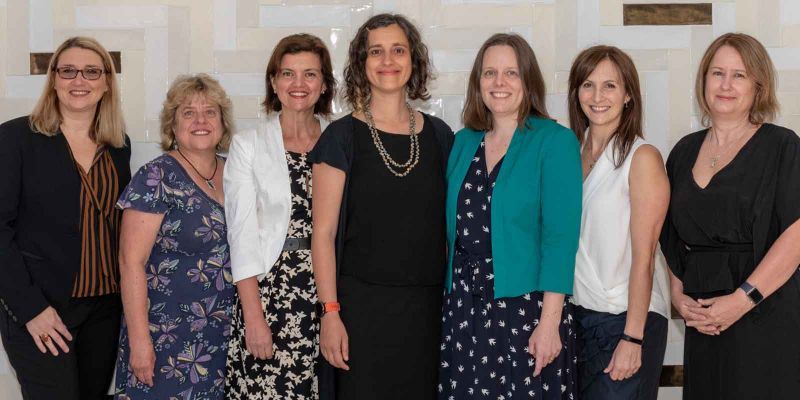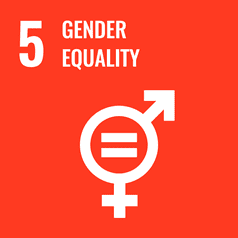For 13-year-old Nashi Reese, it was a no-brainer. Given her enjoyment of maths, the high school student and her Year 8 classmates jumped at the opportunity in June to meet people working across Science, Technology, Engineering and Mathematics (STEM) disciplines at the University of Newcastle. “I never knew how many areas were included in STEM,” she says. “It’s a fascinating area and meeting the people doing research helped me understand it more.”
Nashi’s day-long university visit was made possible by HunterWiSE, a unique initiative that aims to shift negative perceptions of STEM careers among teenage girls through a comprehensive program that connects them with mentors and industry. It is offered to Year 8 students such as Nashi so that they can better plan their elective subject choices for Year 9.
Thirteen schools and more than 250 girls across the Hunter and Central Coast have participated in HunterWiSE since its inception in 2017. As well as meeting researchers, the girls complete STEM-inspired projects, which they then present to their teachers and families at the end of the 10-week program.
The program helps students use creative thinking and STEM to help improve people’s lives and students have come up with some great ways to do just that. For example, some students from dairy-farming families created an app that connected farmers directly to buyers to help them make better profits. Whether it's developing apps to help their local communities, working as a civil engineer or a statistician, or working with the latest robotics technology, this program shows the students that STEM careers are broad, interesting and rewarding.
“We had to do something. We all felt strongly that women and girls could thrive in STEM roles, but they needed support and to learn more about the options available to them."
Providing mentors is also central to the program’s success and civil engineer Barbara Jardim was encouraged to step up and use her experiences to support the next generation of young women considering a career in STEM. Now a senior analyst in infrastructure and capital projects with Deloitte, Barbara completed her PhD at the University of Newcastle in July 2021. “At the very beginning of my PhD candidature, I received an invitation to watch a discussion panel about opportunities for women researchers in STEM,” she says. “I was really impressed with the discussion panel, and I learnt about HunterWiSE. I was excited to become a mentor in the outreach program.”
HunterWiSE took shape in 2017 after an informal gathering of female STEM academics over coffee at the University’s Callaghan campus just outside of Newcastle, NSW. A few months earlier, the Federal Government had launched the Women in STEM and Entrepreneurship (WISE) grants program for projects that boost the participation of girls and women in STEM education and careers. Concerned about the low number of female students enrolling in STEM at the University of Newcastle, the women devised a program to address this.
“We didn’t want them to miss out on extremely valuable, interesting careers,” recalls Professor Anna Giacomini, a civil engineer, who has been one of the driving forces of HunterWiSE. “We had to do something. We all felt strongly that women and girls could thrive in STEM roles, but they needed support and to learn more about the options available to them. None of us thought it would become so big.”

The girls also complete site visits hosted by industry partners such as Hunter Water, BHP, Port of Newcastle and Glencore. “Being a mum with a daughter who at times didn’t feel confident with STEM subjects at school, I think HunterWiSE would have been terrific for her,” says Glencore’s Coal Assets Communications and Community Relations Officer, Tracey Sneddon. “That extra encouragement and support is very important for girls. Having an opportunity to see other women already working in STEM is a really big help in terms of realising that it can be done – and it can be enjoyable, too.”
For Barbara, the opportunity to mentor Year 8 students while they worked on their STEM projects refocused her commitment to supporting the next generation. “By increasing the female representation in STEM we can empower and encourage other young women to choose STEM careers,” she says. “It generates a positive change cycle. HunterWiSE also reinforced for me the importance of having a female role model. I am privileged to have grown up in a very loving family that supported my choice of becoming an engineer. I know that not every girl has the same opportunity in life and HunterWiSE can become that support and encourage these girls in case they don’t have that support from their home.”
The program is already having an impact on Nashi Reese who reckons a career in STEM is “definitely a possibility. I’ve learnt there’s a lot more to STEM than I realised.”
By the numbers
- Women made up less than a quarter of students studying STEM in 2019 (22% of enrolments and 24% of completions of total STEM VET and university enrolments).
- Five years after graduating, men with a STEM qualification were 1.8 times more likely to be working in a STEM-qualified occupation compared to their women peers.
- Having weekly conversations about STEM at home was more common among fathers (51%) compared to mothers (38%). They were also more common among parents of boys compared to parents of girls (47% for boys, 42% for girls).
- There is a significant gender pay gap between qualified men and women working in STEM. The gender pay gap in STEM-qualified industries was $28,994 in 2020 compared to $25,534 across all industries.











